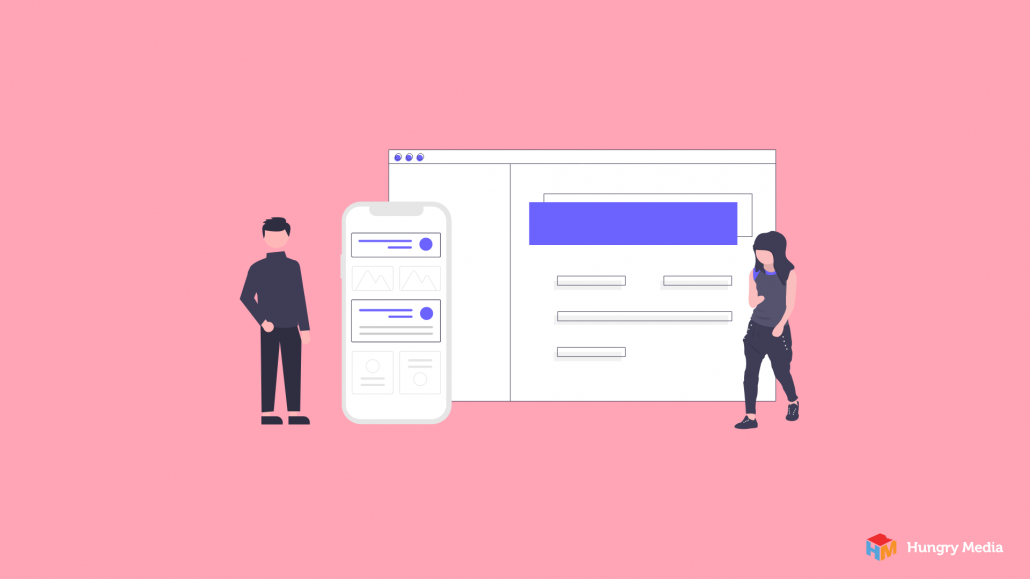
When it comes to a digital presence, there are two ways customers can access a business: website and app. If you’re just beginning to establish yourself in the digital space, where should you focus your resources? Here are a few things to consider when debating between creating an app vs. a website.
What’s the Difference Between an App and a Website?
What is a Mobile Responsive Website?
Design elements like the types of images used, the way information is organized, and the number of options available to users at any given time all change based on screen size. A mobile-first design (for a mobile responsive site) makes considerations for mobile users the priority.
What is a Mobile App and How is an App Different from a Website?
A mobile app is built specifically for use on the mobile operating systems of smart phones and tablets. Each operating system (iOS, Android, and Windows) has its own App Store for users to search, purchase, and download mobile applications. Apps differ from a website in that they must be specifically created for each operating system.
Why Use an App Instead of a Website?
Access to Phone Features
Cameras, GPS, gyroscopes, and other sensors will always work best with a native app compared to a website.
Information Stored on Device
Apps can load and operate quickly because they store data on the device, compared to a website which needs access to server data anytime it is in use.
Offline Access
Whether in basements, train tunnels, airplanes, or anyplace else internet access and cellular connection may be limited, apps continue to function.
Why Use a Website Instead of an App?
While the benefits of a mobile app over a website might seem significant, don’t count a website out of the running yet.
Lower Cost
According to Clutch.io, the average cost of developing a decent app is around $100K. And while the cost of developing a website is also a significant investment, a good website can come with a price tag starting at about $10K.
Develop Once
Remember the three operating systems mentioned above? When developing apps, you’ve got to develop for each platform, which means that you’re actually launching three times, and anytime updates are required or new features established, those require three times the amount of work as well. Websites only require one launch and one set of fixes. Not only does this save time and effort, but it helps keep costs down.
Fast to Launch
Apps must be downloaded, an account must be created, and customers must login before they can even begin to use an app’s features. Websites on the other hand, don’t require anything other than a web browser to get started.
App vs. Website – Which is Right?
Don’t decide on an app vs. a mobile website solely based on current tech trends, because they are just that – trends. They change faster than many companies are able to adapt. So, as you’re just getting started in the digital space, make your decision based on the current priorities of your business. You can always add to your offerings or beef-up functionality down the road.
When Does an App Make Sense?
If your product is an app, then that’s what you should launch first. You can save money in the beginning by starting with only one operating system and opting for hybrid app or mobile web app. Bottom line – if the ultimate goal is to operate as an app, then don’t start with something different.
App Launch Example
OrderEx, an app used by in-person restaurant patrons, streamlines the dining process for both guests and restaurant employees. This is an example of an app-based service which would not function well as a website. In this sense, the product is an app. In this case starting with an app uses resources more efficiently than starting with a website, which would have been turned into an app down the road.
While it’s true that every business needs a website, the purpose of that website may vary. The only real need OrderEx has for a website is simply to educate anyone interested in learning about their offerings and how the app works. Users don’t access the website to place their order, call their server, or pay their bill. All of that is done through the app, alone. So, the OrderEx website functions as a sales tool that aims to provide information for, and connect with, prospective restaurant clients.
When Does a Website Make Sense?
Unless your product is an App, then start with a website. Once your website is fully functional, and you’ve gathered and analyzed user data, you can begin to consider ways to leverage a mobile web application or native app. This saves time and money up front, of course. And collecting data to gain a clear understanding of what your customers want and need will save you time and money on app development down the road.
Website Launch Example
Olive and June, a company that sells at-home manicure and pedicure systems, is the perfect example of a business that should (and did) launch a well-developed mobile-responsive website instead of an app.
Their website was clearly built with mobile-first and UX design principles in mind, and it provides all the functionality customers want and need. Users can browse Olive and June products, make purchases, and watch video tutorials from any device, with ease.
They could easily make their website an app down the road, but it’s not a requirement. If the company opts to go that route, they can use website analytics to gather data about the operating systems on which customers access their site (so they know which system would be the best to launch an app), easily determine which of their web pages are accessed most often (so they know what is most important to their guests), and have plenty of time to get their operations, products, and customer service right before taking on the large-scale task of app development.
App vs. Website: Let Us Help You Decide
Don’t wait until you’ve decided on an app vs. a website to reach out. If you’re stuck in the decision-making process, Hungry Media’s four-step approach will help you uncover the best option for your business – and then we can get to work for you! Whether you decide on a full-scale launch of a mobile app, or an MVP launch on a basic website, we can make it happen. Contact us today to share your ideas and see how we can help make your vision a reality.
contributed by Melissa Lucas, senior staff writer



